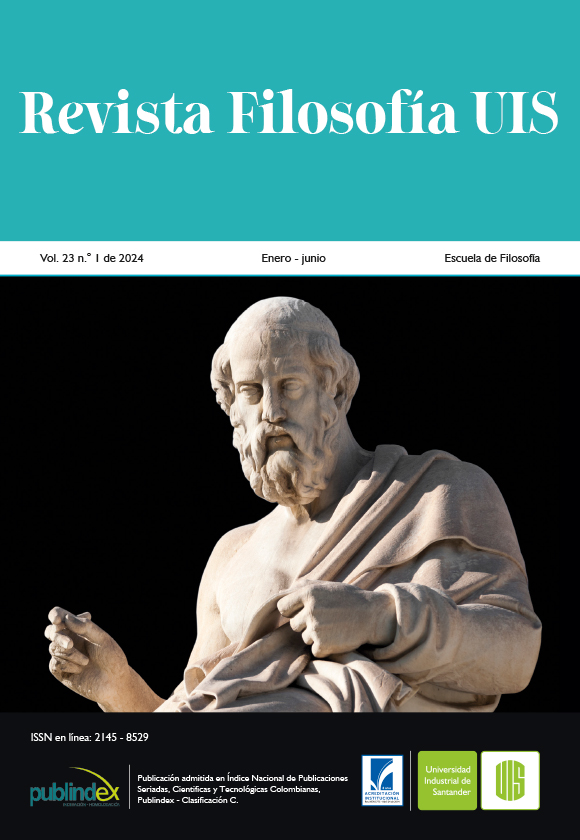Karl Marx, The Hermeneut: A Criticism of the New Theological Grammar of Capitalism
Published 2024-01-02
Keywords
- capitalism,
- theology,
- guilt,
- debt,
- subjectivity
- hermeneutics,
- Marx ...More
How to Cite
Copyright (c) 2024 Revista Filosofía UIS

This work is licensed under a Creative Commons Attribution 4.0 International License.
Abstract
The model of the human being: homo oeconomicus, imposition by the economy capitalist rationality, has been in the last two decades a metamorphosis hard, scilicet, the formation of a guy (type) subjectivity perform in the figure of the “entrepeneur” or “be your boss” that from a new theological grammar, embody a trade project artful and surreptitious tha conditions between the subjects. Because of this, the purpose of the text is think this one problematic as of test critical-hermeneutic executed by young Marx, for submit to the analysis the categories of onus, due, offering and redemption highlighteds by Wlater Benjamin, by the light of the categorie essence subjective of the private property that allow us understand as the capitalism uses the theological language for continue holdingliable to the human being from his poverty, from his richness or from his economic washout.
Downloads
References
- Aguilar, M. (1998). Confrontación, critica y hermenéutica Gadamer, Ricoeur, Habermas. Fontamara, UNAM.
- Benjamin, W. (1985). Gesammelte Schriften Vol. VI. Kapitalismus als Religion, Suhrkamp Verlag.
- Casson, M. C. (1982). The entrepreneur. An economic theory. Martin Robertson.
- Chul Han, B. (2014). La agonía del eros. Herder Editorial.
- Feuerbach, L. (1969). Tesis provisionales para la reforma de la filosofía. Calden Editorial.
- Foucault, M. (1969). Nietzsche, Freud, Marx. Revista Eco 113(5), t. XIX, 5-6-7.
- Gadamer, H. (1977). Verdad y método. Ediciones Sígueme.
- Habermas, J. (1986). Ciencia y técnica como ideología. Tecnos Editorial.
- Heidegger, M. (1994). Artículos y conferencias. Serbal Editorial.
- Marcuse, H. (1993). Hombre unidimensional. Editorial Planeta-De Agostini S.A.
- Marx, K. (1968). Contribución a la crítica de la filosofía del derecho de Hegel. Claridad S.A.
- Marx, K. (1969). Tesis provisionales para la reforma de la filosofía. Calden Editorial.
- Marx & Engels (1970a). Gesamtausgabe. Mega I, Band, 5. Die Deutsche Ideologie (1845-1846). Detlev Auvermann KG.
- Marx, K. & Ruge, A. (1970b). Los anales franco-alemanes. Martínez Roca Editorial.
- Marx, K. (1974a). La ideología alemana. Pueblos Unidos Editorial.
- Marx, K. (1974b). Cuadernos de parís. Notas de lectura 1844. (Bolívar Echeverría, trad.). Era editorial.
- Marx, K. (1980). Manuscritos de economía y filosofía. Alianza Editorial.
- Marx & Engels (1982). Gesamtausgabe. Mega I, Band, 2. Artikel Entwürfe. März 1843 bis August 1844. Dietz Verlag.
- Marx, K. (1984). Miseria de la filosofía. Orbis Editorial.
- Marx, K. (2008). Contribución a la crítica de la economía política. Siglo XXI Editores.
- Recas, J. (2006). Hacia una hermenéutica crítica Gadamer, Habermas, Apel, Vattimo Rorty, Derrida y Ricoeur. Biblioteca Nueva.
- Ricoeur, P. y Rincón González, A. (1973). Ciencia e ideología. Ideas y Valores, (42-45), pp. 97-122. https://revistas.unal.edu.co/index.php/idval/article/view/2911
- Rico Palacio, D. E. (2019). Individuo, trabajo y neoliberalismo. Revista Filosofía UIS, 18(1), 151-170. https://doi.org/10.18273/revfil.v18n1-2019007
